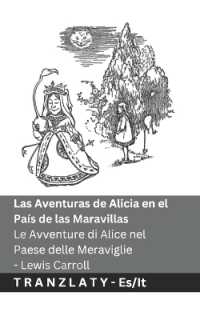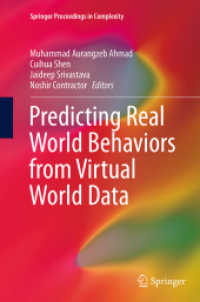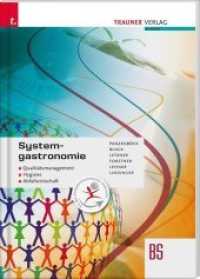- ホーム
- > 洋書
- > 英文書
- > History / World
Full Description
Foreign Policy and Security Strategy collects works by the late Professor Martin Wight (1913-1972), an historian and scholar of international relations. Wight conducted research on many topics, including British colonial history, European studies, international institutions, and the history of states-systems. He is nonetheless best known for his lectures about the political philosophy of international relations at the London School of Economics (1949-1961) and the University of Sussex (1961-1972). He is widely regarded as an intellectual ancestor and pathbreaker of the "English School" of international relations, even though this term only gained currency nine years after his death. The "English School" is usually construed as signifying an approach to the study of international relations more rooted in historical and humanistic learning than in the social sciences.
Despite Wight's reputation as a scholar focused on historical and philosophical matters, he articulated noteworthy policy prescriptions in six domains: (a) the balance of power; (b) international order, notably regarding neutrality and nationalism; (c) nuclear weapons and international politics; (d) interests, honour, and prestige in statecraft; (e) disarmament and public opinion; and (f) the United Nations. These writings have been neglected, partly because his perfectionism led him to refrain from publishing many of them. However, as this new collection of his works (many previously unpublished) shows, he took distinctive positions on practical policy questions. He asked "Does Peace Take Care of Itself?" - as implied by Kantian principles - and concluded that it does not, and that purposeful action will therefore be necessary.
Contents
Foreword by Paul Schulte
1: Introduction: Martin Wight on Foreign Policy and Security Strategy
2: The Balance of Power in Diplomatic Investigations
3: The Balance of Power and International Order in The Bases of International Order
4: Does Peace Take Care of Itself?
5: The Idea of Neutrality
6: Nationalism and World Order
7: Has Scientific Advance Changed the Nature of International Politics in Kind, Not Merely in Degree?
8: The Political Consequences of Nuclear Weapons
9: War and Peace: The Hobbesian Predicament
10: War and Peace: Nuclear Weapons and Change in International Politics
11: Arms Races
12: Interests of States
13: Interests, Honour and Prestige
14: Is the Commonwealth a Non-Hobbesian Institution?
15: Suggestions for a Projected Study of International Security Organisation
16: From the League to the UN
17: The United Nations Assembly
18: The United Nations General Assembly
19: The Security Council
20: Two Blocs in One World
21: The Power Struggle within the United Nations
22: Review of Henrique de Pinheiro, The World State or the New Order of Common Sense
23: Review of John Middleton Murry, Trust or Perish
24: Review of David Mitrany, A Working Peace System: An Argument for the Functional Development of International Organization (London: National Peace Council, 1946)
25: Review of Ely Culbertson, Must We Fight Russia? (Philadelphia: The John C. Winston Company, 1946)
26: Review of C. E. M. Joad, Conditions of Survival (London: Federal Union, 1946)
27: Review of J. L. Brierly, The Covenant and the Charter (Cambridge: Cambridge University Press, 1947)
28: Review of W. W. Rostow, The American Diplomatic Revolution (Oxford: Clarendon Press. 1947)
29: Review of William C. Bullitt, The Great Globe Itself: A Preface to World Affairs (New York: Scribner, 1946, and London: Macmillan, 1947)
30: Review of Frances Perkins, U.S. Secretary of Labor from 1933-1945, The Roosevelt I Knew, (New York: Viking Press, 1947; London: Hammond, Hammond & Co., 1947)
31: Review of Barbara Ward, Policy for the West (London: Penguin, 1951)
32: Review of John MacLaurin, The United Nations and Power Politics (London: Allen and Unwin, 1952)
33: Review of Hugh Seton-Watson, The Pattern of Communist Revolution (London: Methuen, 1953). (American Edition: From Lenin to Malenkov: The History of World Communism, New York: Praeger, 1953)
34: Review of A. P. Thornton, The Imperial Idea and Its Enemies: A Study in British Power (London: Macmillan, 1959)
35: Review of John H. Herz, International Politics in the Atomic Age (New York: Columbia University Press, 1959).
36: Review of Rupert Emerson, From Empire to Nation: The Rise to Self-Assertion of Asian and African Peoples (Cambridge, Massachusetts, Harvard University Press; and London, Oxford University Press, 1960)
37: Review of Hugh Seton-Watson,Neither War nor Peace: The Struggle for Power in the Post-War World (London, Methuen, 1960)








